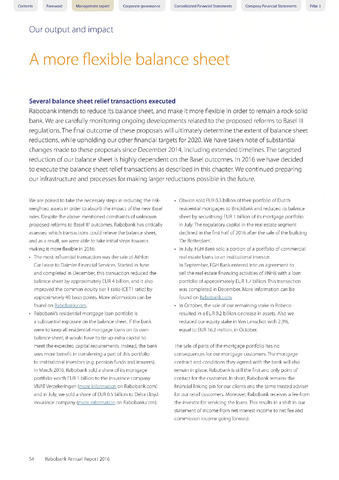A more flexible balance sheet
Our output and impact
Several balance sheet relief transactions executed
Rabobank intends to reduce its balance sheet, and make it more flexible in order to remain a rock-solid
bank. We are carefully monitoring ongoing developments related to the proposed reforms to Basel III
regulations. The final outcome of these proposals will ultimately determine the extent of balance sheet
reductions, while upholding our other financial targets for 2020. We have taken note of substantial
changes made to these proposals since December 2014, including extended timelines. The targeted
reduction of our balance sheet is highly dependent on the Basel outcomes. In 2016 we have decided
to execute the balance sheet relief transactions as described in this chapter. We continued preparing
our infrastructure and processes for making larger reductions possible in the future.
Contents Foreword Management report Corporate governance Consolidated Financial Statements Company Financial Statements Pillar 3
We are poised to take the necessary steps in reducing the risk-
weighted assets in order to absorb the impact of the new Basel
rules. Despite the above-mentioned constraints of unknown
proposed reforms to Basel III' outcomes, Rabobank has critically
assessed which transactions could relieve the balance sheet,
and as a result, we were able to take initial steps towards
making it more flexible in 2016:
The most influential transaction was the sale of Athlon
Car Lease to Daimler Financial Services. Started in June
and completed in December, this transaction reduced the
balance sheet by approximately EUR 4 billion, and it also
improved the common equity tier 1 ratio (CET1 ratio) by
approximately 40 basis points. More information can be
found on Rabobank.com.
Rabobank's residential mortgage loan portfolio is
a substantial exposure on the balance sheet. If the bank
were to keep all residential mortgage loans on its own
balance sheet, it would have to tie up extra capital to
meet the expected capital requirements. Instead, the bank
sees more benefit in transferring a part of this portfolio
to institutional investors (e.g. pension funds and insurers).
In March 2016, Rabobank sold a share of its mortgage
portfolio worth EUR 1 billion to the insurance company
VIVAT Verzekeringen (more information on Rabobank.com)
and in July, we sold a share of EUR 0.5 billion to Delta Lloyd
insurance company (more information on Rabobank.com).
Obvion sold EUR 0.3 billion of their portfolio of Dutch
residential mortgages to BinckBank and reduced its balance
sheet by securitising EUR 1 billion of its mortgage portfolio
in July. The regulatory capital in the real estate segment
declined in the first half of 2016 after the sale of the building
'De Rotterdam'.
In July, FGH Bank sold a portion of a portfolio of commercial
real estate loans to an institutional investor.
In September, FGH Bank entered into an agreement to
sell the real estate financing activities of RNHB with a loan
portfolio of approximately EUR 1.7 billion. This transaction
was completed in December. More information can be
found on Rabobank.com.
In October, the sale of our remaining stake in Robeco
resulted in a EUR 0.2 billion decrease in assets. Also we
reduced our equity stake in Van Lanschot with 2.3%,
equal to EUR 16.2 million, in October.
The sale of parts of the mortgage portfolio has no
consequences for our mortgage customers. The mortgage
contract and conditions they agreed with the bank will also
remain in place. Rabobank is still the first and only point of
contact for the customer. In short, Rabobank remains the
financial linking pin for our clients and the same trusted adviser
for our retail customers. Moreover, Rabobank receives a fee from
the investor for servicing the loans. This results in a shift in our
statement of income from net interest income to net fee and
commission income going forward.
54 Rabobank Annual Report 2016

